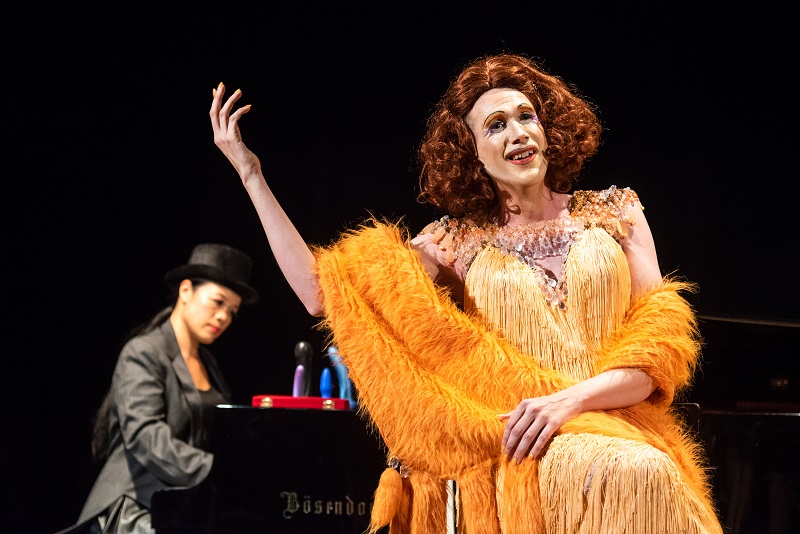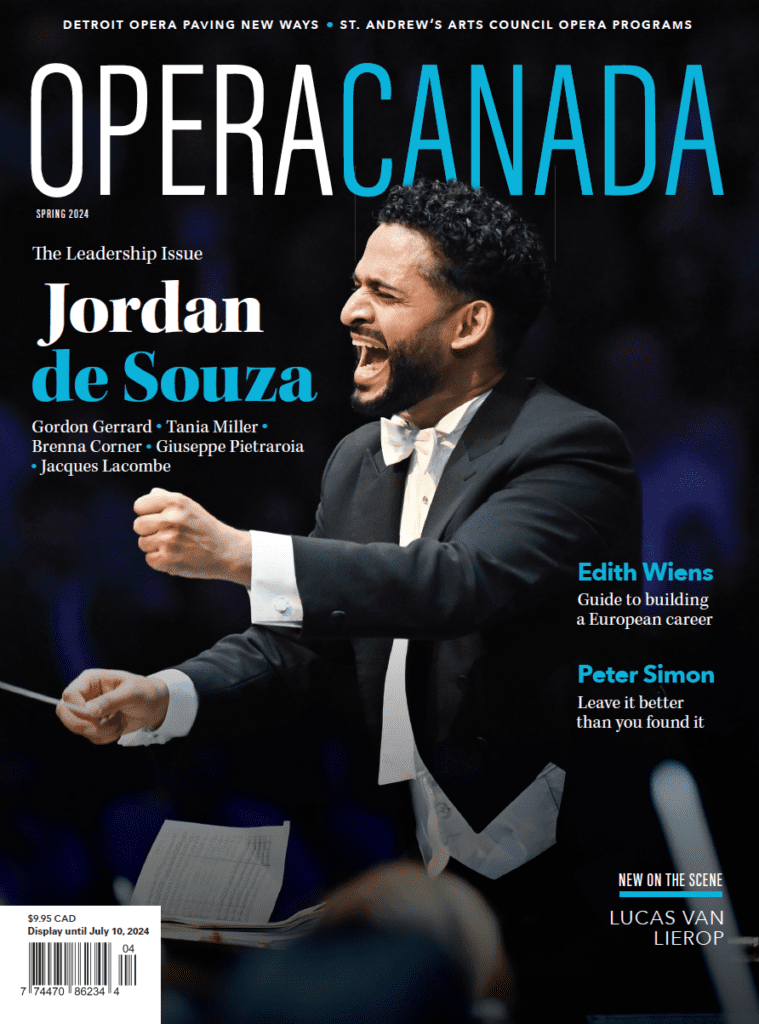“My voice teacher was verbally abusing me,” explains Emily Bilton, drag artist and opera alum. “I ended up failing my third-year recital by 2 percent. I had to get a 65 and I got a 63. And the only explanation they could give me was that my tone wasn’t what they wanted it to be. [But] it was the natural way I sing. I think it’s because they found out I was doing stand-up and improv and my teacher was vocally unhappy about it.”
Bilton, who has been immersed in opera since she was a child, confesses that she’s wanted to be a performer for as long as she could remember.
“When I was 10 I was invited to sing [in] the children’s chorus of Carmen… I was one of the boys in Carmen and I literally walked on stage and realized that’s what I wanted to do for the rest of my life and I was lucky that I was good at it.”
Yet what she found at Schulich School of Music’s opera program was an environment cannibalized by rigidity; a world that was “kinda small” and “very old school in their teaching.” Chafed under the limits of what opera could offer, and against the wishes of her professors, Bilton pursued other performance styles. “I started doing things that I could do without telling [my teacher], which happened to be improv and stand-up. And so by the end of my degree [I] was kind of doing those more than anything else.”
Eventually, this led her from opera to that most irreverent of arts: drag.
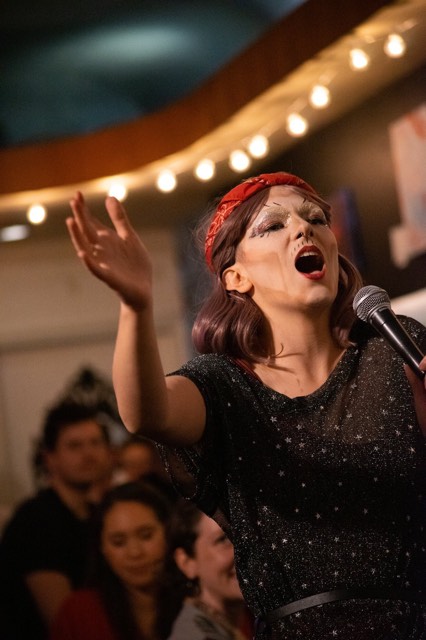
Emily Bilton performing as her drag-king persona Channing Titanium at Off Tune, a monthly singing drag show—Photo: Cole Schmidt
“Channing Titanium is a lost boy, honestly…I was playing this character who didn’t have a dad and therefore didn’t understand the world. And he’s kinda evolved into this genderless high energy elf.”
After conceiving her on-stage persona, Channing Titanium, Bilton followed her love of performance across Canada to British Columbia, where she performs professionally as a drag king—the drag queen’s masculine counterpart. In doing so, Bilton became one of a growing cadre of opera singers turning their skills towards drag.
Opera and drag’s strangled voices
Propelled by the popularity of RuPaul’s Drag Race, a competition-style reality show bent on finding ‘America’s Next Drag Superstar,’ and buoyed by the increased consumption of queer media as a whole, drag has enjoyed a recent rise in the popular eye (a rise that has come under critical scrutiny). Conceived by sexual minorities to express themselves amid marginalization, drag was never limited by convention. Encompassing fashion, singing, dance, and comedy, the straights (myself included) have found a lot to like in drag, as have artists attracted to its flexibility. One such performer is former opera singer and current opera administrator Joel Klein, whose alter ego, Maria Toilette, was the kind of spur-of-the-moment creation befitting drag’s transgressive roots.
“I was singing ‘Glitter and Be Gay’ [from Leonard Bernstein’s Candide]…and then thought I should just go in Mary Antoinette drag because it’s over the top and gorgeous, and I was in the middle of putting on my makeup and somebody asked me how I should be introduced, and I had no idea! I hadn’t even thought of my drag name. And it just came to me like, Maria Toilette. So there she was.”
Like Bilton, Klein cites dissatisfaction with opera’s rigidity as a catalyst for his transition away from performing classically, which, he says, “was the [original] plan.”
“It didn’t even occur to me that we could do our own thing until I’d worked in contemporary dance administration… and then I was like, ‘Oh look. Look what these dancers can do. They can just build any show they want. They can do anything that they want with the art form.’ On stage it’d never crossed my mind that we were allowed to do that in opera. It is a very feudal, very restricted form. Or it can be.”
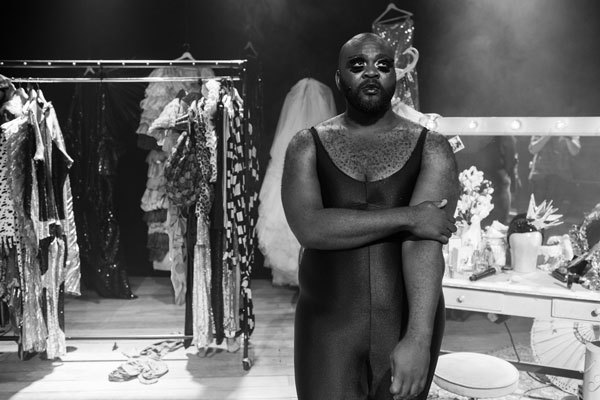
Contemporary drag and opera performer Le Gateau Chocolat, one of many artists to explore both mediums—Photo: Le Gateau Chocolat Gallery
Dr. Juanita Knight, a Project Coordinator at McGill’s Music Perception and Cognition Lab and a private music teacher, echoes this point in what she sees is a slow flight from opera.
“I see more and more kind of crossover work being done,” says Knight. “People going to straight theatre, people going to drag, people going to pop, rock, other ways to express themselves. Or even just more contemporary opera… [there], themes can be openly explored and you don’t have to worry about, you know, traditional opera fans renouncing their subscriptions.”
“You have to live your whole life in accordance to all these corporate rules and pretend you don’t want to grow your hair long,” Knight added. A former opera student herself, she is no stranger to the personal toll this tradition-obsessed pedagogy can take on a student.
“When I was in school it was, you know make sure if you get a tattoo you have make up that can cover it up, if you have piercings make sure you can take them out, if you have a strange laugh make sure you practice to laugh better because you don’t sound like a soprano when you laugh like that.”
“I got this great technique but I had my spirit crushed.” Knight contends that institutional rigidity is doubly fraught for queer students, who have to contend with a concept of formality rooted in cis-gendered, heterosexual identity.
Equally restrictive are matters of liquidity: money permeates opera, not just in the elitist undertones that inform its image (which, some argue, has alienated the art from modern audiences), but in the favouritism lavished on those with more access to resources.
“You really see that at school,” says Bilton. “Because it was the kids that could study all summer in Italy and who didn’t have to have a part-time job during school [who] were the ones that would get all the opera roles. So there’s this really clear connect between financial privilege and success in the opera world.”
It is a privilege that extends beyond graduation and into professional life, where financial success is notoriously hard to come by.
“It was just like, ‘what is this even? What is this career?’,” expressed Klein of his own frustration. “And the amount of money that I was making was not very high and I was working quite a bit and I saw that it was going to be that for a long time and I don’t come from a wealthy family, so it was like, ‘I’m going to have to make money at some point!’.”
Despite these difficulties, neither singer wants to dismiss the work of opera’s artists and labourers.
“UBC Opera does an absolutely fantastic job at what it does,” asserts Klein, who continues to work in opera administration and has no plans of hanging up his opera glasses for good.
“I don’t want to discredit the people who do work really hard,” adds Bilton.
Amid these difficulties neither has responded with wholesale rejection; rather, both Bilton and Klein have funneled their opera talents away from its own institutions and onto the drag stage. The result is an artistic freedom to present opera as deconstructive, not just of itself, but of the gendered hierarchies on which it, and most of society, are built. In doing so they’ve taken the erroneously dismissed-as-archaic operatic language to new pastures.
Lessons in opera ‘Herstory’
Drag and opera’s recent dalliances do not constitute a novel epiphany; opera has a long, storied history of getting freaky with gender, even if not explicitly in the name of deconstruction.
“We, in many cases, accidentally stumbled on these more subversive traditions in opera,” posits Aria Umezawa, a Canadian opera director who has striven throughout her career to expand queer voices in opera. “[Like] mezzo-sopranos and pants roles sort of on the surface being [born] as a result of no longer being able to use castrati.”
The tradition of castrati—gelding young boys to prevent testosterone development during puberty, thus preserving their high-pitched, prepubescent voice—emerged in the mid-16th century and peaked in the 17th century before gradually declining. While this cruel tradition seems ancient and far-flung, castrati continued to exist until relatively recently, with the last known castrato, Alessandro Moreschi, passing away in 1922. At their peak castrati were considered primo uomo, replacing deep ‘developed’ male voices to become the standard voice of masculinity.
“The reasons [castrati] were so popular was because we used to believe we could freeze men at their sexual peak by castrating them,” explains Umezawa. “And so that voice… actually represented a man at his most virile.”
“That’s also why pants roles represent men at their sexual prime. Like, they’re always the hero, they’re never the butt of the joke.”
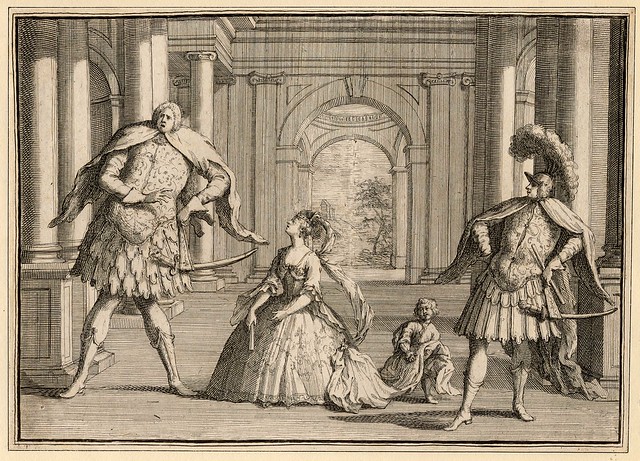
Caricature highlighting the castrato physique from of a performance of Handel’s Flavio— unknown author
Yet while castrati represent the starkest example of pre-modern questions of identity in opera, they are by no means the only such example. In exploring the institution of castrati, Dr. Knight found a breadth of operatic gender-bending.
“I came back to this phenomenon of the castrati and found out [composers] were writing drag and travesti roles at the same time as castrato roles,” explains Knight. “So in the same [opera] you could have two castrati playing the male and female romantic leads, and a woman in travesti playing the page and then a man in drag playing the nurse, and this would all be in the same opera. And there was no need for the castrati because you had the drag and pants roles right there, it’s just very strange how it all existed together.”
As the Mozarts gave way to the Verdis, and the Verdis to the Puccinis, opera’s hurly-burly tornado of drag and gender-bending ceased to be dictated by artistic exploration or convenience, but by that capital ‘T’ of Tradition that swallowed the medium somewhere along the way. That pants roles, above any other type of queerness (explicit or otherwise), are all that remain of this tradition on the most orthodox stages is a testament to this.
Knight saw this orthodoxy in recent Montreal productions where, according to her, some audience-members were off-put by a male love-triangle in the opera Les Feluettes. “They had season tickets and they called and complained and said, ‘we don’t want to see that’.”
“But the one thing we know for sure is that it’s got to be a woman that plays Cherubino,” the randy page-boy from Mozart’s The Marriage of Figaro.
Queen of the Nightlife
As I have written before, it is both ironic and fitting that much of opera’s path forward bears uncanny parallels to its distant past; that in leaving prosceniums for pubs, singers poise themselves to recapture much of opera’s forgotten ramshackle rowdiness.
“They just used who they had,” says Knight. “And Handel was known to rewrite pieces if, you know, there was a mezzo in town that week and she was really good…he just rewrote it!”
“The perception of opera as this boring, stuffy, dusty thing is completely wrong. Maybe it has become that because that’s what the hardcore, die-hard, season-ticket holders want. But it was never really intended that way. It was always kind of pushing boundaries and very sexy.”
This “just rewrite it” approach, where operas were changed on the fly, faded as budgets for opera grew and room for error began to shrink. But the house of drag, the clubs and bars, forced those like Bilton, who are taking opera into these venues, to rediscover this improvisational edge.
“You just have to be really flexible,” says Bilton. “I performed [a show] where I couldn’t touch the microphone because it would make terrible noises and I was like, you know what we’re gonna do all of this standing!”
“Sometimes…we can go into the audience and sit on these people’s laps and sing opera to them, and get them to sing along.”
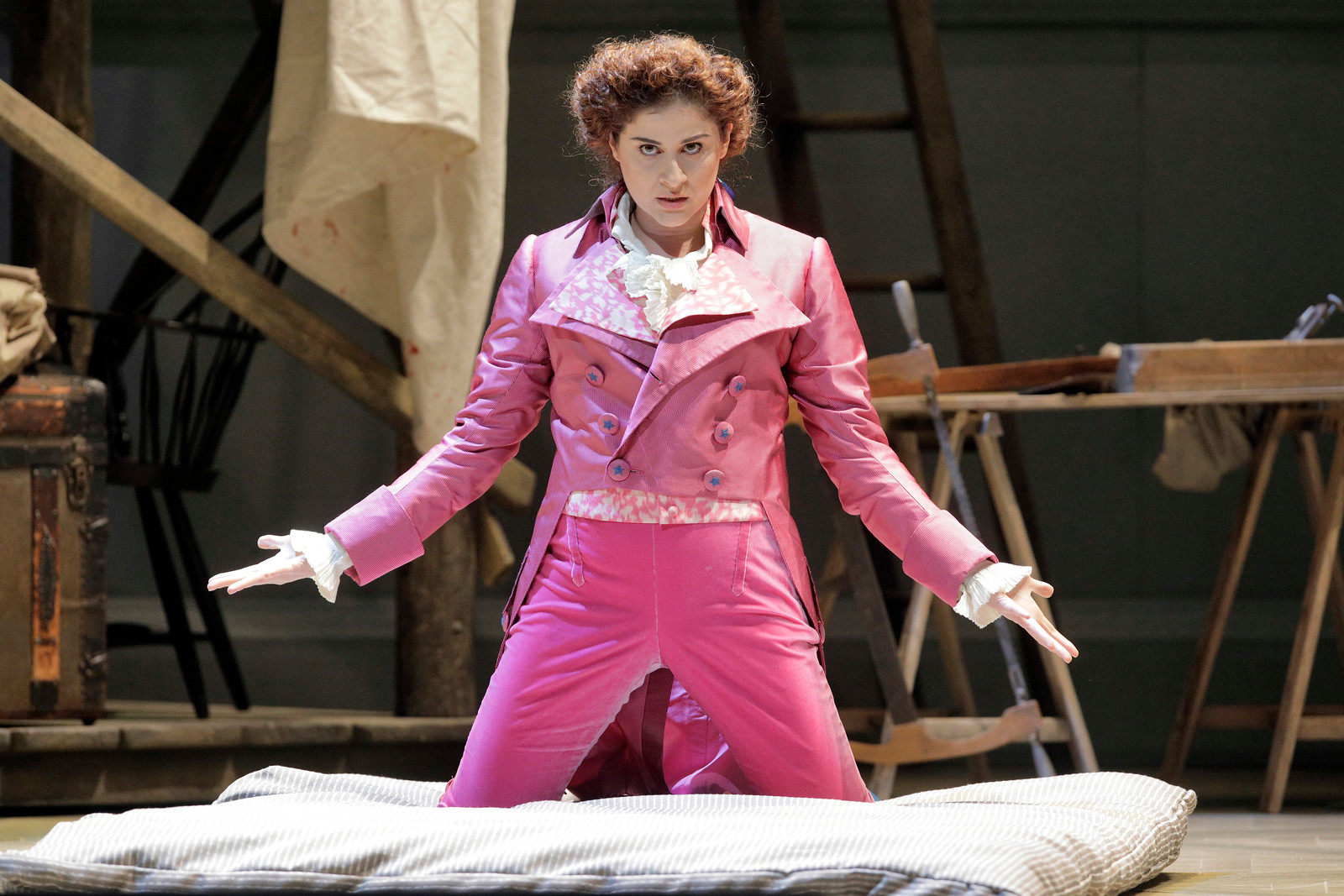
Serena Malfi in the pants role Cherubino in San Francisco Opera’s 2019 The Marriage of Figaro—Photo: Cory Weaver

Teiya Kasahara in a non-pants queer interpretation of Cherubino in AtG’s 2013 Figaro’s Wedding—Photo: Against the Grain Theatre
When microphones can break and audiences heckles (which Bilton encourages), fourth-walls become almost quaint. The venues’ tactility and lack of polish allows Bilton to explore the communality of opera’s repertoire, to reinterpret its emotional potential. It is a degree of artistic control that, she says, has seen her skills improve dramatically.
“In the opera world if I were to sing [Mozart’s] Queen of the Night that would have been [rated] a 2; if I get into drag and sing [it] that’s a 12. It was so liberating,” she says, explaining her interpretation of Queen’s aria which takes its raw fury and transposes it to the context of an enraged hockey fan. For Bilton, the point isn’t the story or libretto, which, out of context, club audiences won’t understand anyways. The point is the emotion of the piece.
“I do handstand opera. Where I do a handstand and sing opera in drag which becomes a lot more clown-esque. I also do this thing where I bring people on stage and tell them, that we’re singing the original gay anthem, and then I make them sing along to ‘Voi che sapete’ from [Mozart]’s The Marriage of Figaro with me.”
“What I like to incorporate in my stand-up and my drag is making people feel like they know the song. Involving them, making them sing along in parts asking them ‘hey what’s your favourite Baroque song by Handel,’ you know? And then make it seem like they actually know what it is. I just feel like it’s a fun thing to be like, there’s all of these songs that exist and that we take for granted that are so beautiful and we enjoy them and they’re written almost the same as modern songs. Why can’t we treat them the same way?”
Aria Umezawa has been experimenting with the audience’s role in opera in her recent works, taking the communal aspects of grass-roots mediums to the opera house. For Opera 5’s production of Johann Strauss’ Die Fledermaus she cast Justin Miller, a buffa-trained drag performer, and his persona Pearle Harbour in the role of an announcer, interacting with the audience to bridge the gap between spectator and character.
“For Die Fledermaus, where that came from was we say that opera is for everyone but everything’s very passive in how we do this. Like we present something on the stage and then the audience shows up and it leaves it to chance a little bit.”
“The question around [Fledermaus] was could we engage? Could we get the audience to engage in opera and elicit a more powerful emotional reaction to the artform through immersive theatre?”
Although Umezawa insists that her choices in Fledermaus were originally practical and philosophical, she recognizes the parallels between drag’s audience-oriented approach and what she is looking to bring to opera. For herself and Bilton, the communality of drag has become a salve to their perceived conceptual disconnect between opera and its audience, lending a sense of tactility to the form.
That being said, this philosophical approach does not constitute the be-all-end-all of drag and opera’s intersection. For Klein, who started his career as Maria Toilette singing “transposed arias,” the artistic thrill comes in subversion.
“I find, in my own experience with audiences, what people really love, is the combination of what they consider an ultra-high art-form experience of hearing the trained operatic voice [expel] complete vulgarity. There’s something about the shock that people find [engaging]. Plus all of the costuming, it takes a little while for people to settle in but then they’re willing to accept in the suspension of disbelief… much like in opera… Because seriously, sometimes those people are in their seventies playing Romeo!”
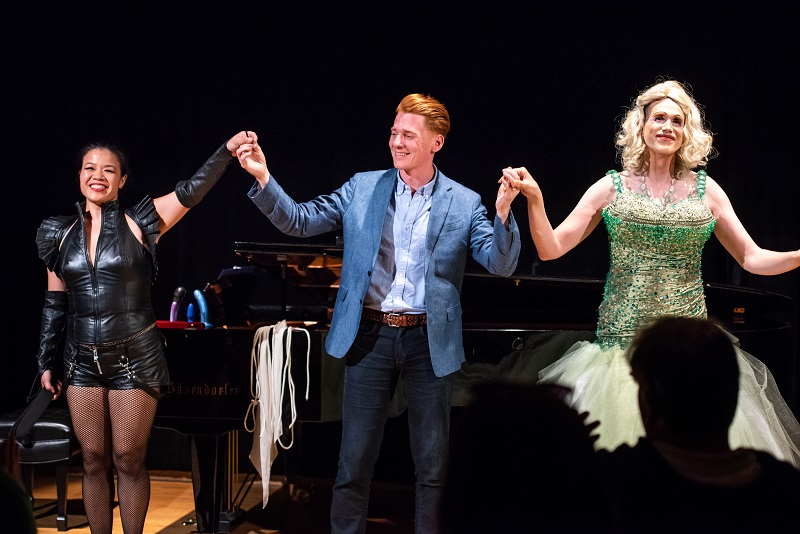
Left to right: Pianist Karen-Lee Morlang (the Morekeys de Sade), composer Isaiah Bell, & Joel Klein (Maria Toilette) in Tapestry Opera’s Cocktales with Maria—Photo: Dahlia Katz
Meanwhile for Isaiah Bell, who co-created Klein’s show, Cocktales with Maria, the impetus to marry drag and opera is different from either Klein’s subversions or Bilton’s communality. Bell’s inspiration is more one of familiarity than irreverence.
“I’m swimming in opera every day,” he explains. “That’s the language that I’m speaking and I want to use that language to express something that’s true to me.”
Opera, stripped of its accouterments and context, becomes, as Bell describes, a performative language like any other. It can be interpreted anywhere and in any way, and need not be limited by prescriptivism. It is no wonder then that in its flexibility, drag has become a focal point for those hoping to ‘talk-the-talk’ in their own dialect, without the baggage of precedent. And in recent years, more classically-trained students have flocked to its glittered halls: from Brooke Lynn Heights, Canada’s own ballet-trained Queen of the North, to RuPaul contestant and opera singer Monet x Change. Bilton herself has begun to notice this trend.
“People started coming up to me and being like, I have a degree in opera! I have a degree in physical theatre!”
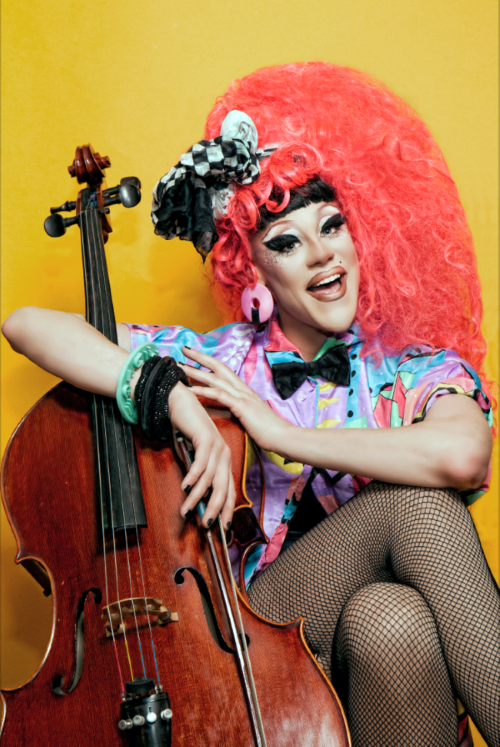
Professional musician and DragRace contestant Thorgy Thor has performed alongside the Pittsburgh Symphony Orchestra, & Vancouver Symphony Orchestra—Photo: Thorgy Thor Press
Old borrows new
Amid this steady flight of those trained in opera towards more poppier artforms, opera education has begun to take meaningful steps to adapt. In a previous feature on UofT’s Early Music program, program head Daniel Taylor explains his pedagogical focus on individual singers, and encouraging their unique voice. Such changes, according to Dr. Knight, are making their way to McGill and elsewhere.
“Some of the younger opera scholars are looking at what happened 400 years ago and wanting to see that kind of stuff go on today. So it’s very very old but it’s also kind of new, and it’s not what was happening 50 years ago.”
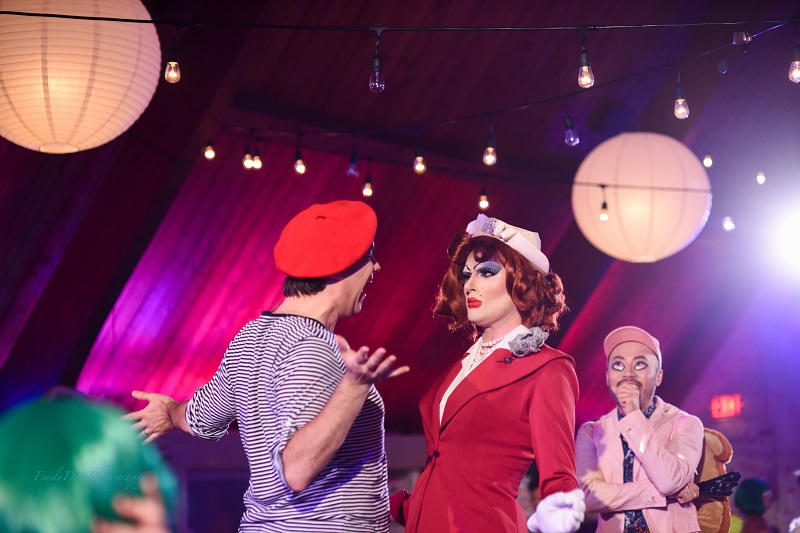
Left to right: Michael Barrett as Eisenstein, Pearle Harbour as herself, & Keith Lam as Dr. Falke in Opera 5’s 2016 production of Die Fledermaus—Photo: Emily Ding Photography
It is ironic then that as opera singers trickle into drag and push the boundaries of both mediums, drag is beginning to show signs of the same kind definitional rigidity, constructed around the phenomenon of RuPaul’s Drag Race.
“People are making the mistake of thinking that RuPaul and RuPaul’s Drag Race represent the entire drag culture scene and that’s just fundamentally not true,” laments Umezawa. “The risk is when you let one person’s ideology speak for an entire group.”
But so long as clubs and indie theatres hum, so long as people continue to recognize the beauty of self-expression, those who take it upon themselves to declare what is and what isn’t proper will continue to find themselves left behind.
Miller, whose drag persona Pearle Harbour is designed as a scathing critique of the kind of toxic nostalgia that threatens art, summarized the sentiment well.
“It’s arrogant to believe that any of our languages will not change, you know? That’s how languages die. When you have pedants protecting [it] on behalf of decency and morality… it’s these people who fundamentally do harm because language… must necessarily change because audiences are changing because our world is changing. And it seems foolish to ignore that for the sake of tradition for tradition’s sake… Ultimately that’ll just end up creating safe and predictable art. And especially in dangerous times art should never be safe.”
Drag is not safe, and neither is opera. Opera is traditional. It is avante garde. It is Baroque and it is Cyberpunk. It is funny, touching, and heart wrenching. It is Eurocentric, and a voice for the marginalized. Now opera is drag, with all the ostentation and frills that make drag great. And it is in this rainbow-variety that opera asserts itself, and will continue to assert itself for as long as there are singers to sing.

